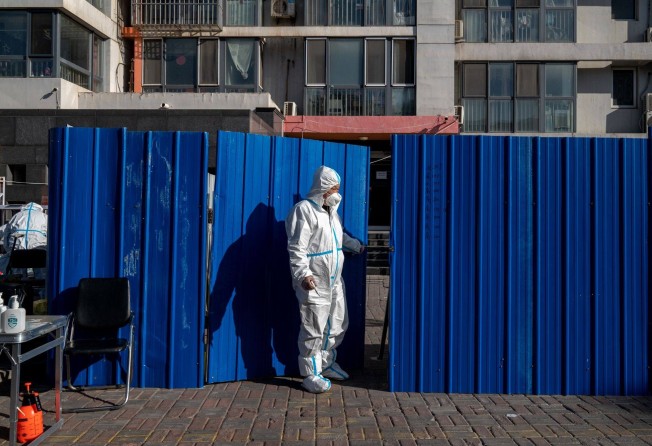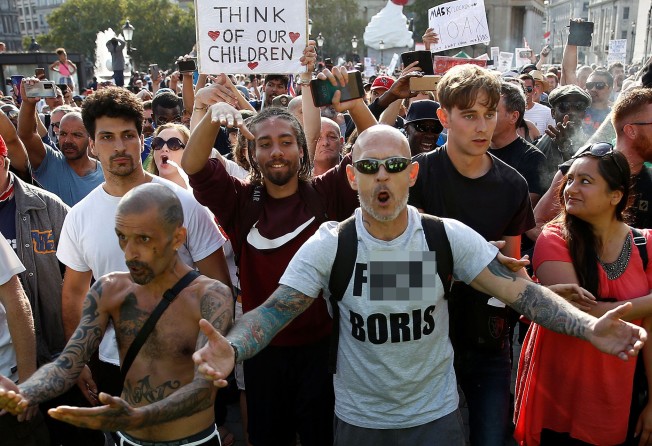
01:58
China arrests 7 people after violent clashes between residents and Covid lockdown enforcers

A Chinese friend here in the UK told me she has been in a heavy mood lately. “No Chinese person with a conscience can avoid what is happening in China,” she said, then added: “When I compare the Covid-19 lockdowns here and there, I finally know what democracy is.”
It is indeed difficult for first-generation Chinese living overseas to understand what democracy is. Our thinking is at least 100 years behind that of contemporary British people. We mostly aspire to the acquisition of money and power, and are unable to see the new political trend of the 21st century in Britain: the pursuit of equality between all races, genders and classes.
Once, my understanding of democracy was limited to elections and voting, plus the “welfare system that keeps Westerners lazy” because “political parties buy votes with money”, as reported by the Chinese news channels. It was after watching the BBC news that my view finally changed.
At first, I was confused as to why the most pressing news stories in the UK were often related to the difficulties facing ordinary people: their benefits were being cut, they couldn’t afford to pay their gas bills, they had no food to eat, and so on.
By contrast, the subjects I saw covered on Chinese CCTV news were all related to the government, and if there was any footage of ordinary people, it was because government leaders had gone to care for those lucky residents.
We were always told that the government loved us, and we saw these news stories as an expression of that love. We also learned that we had to put aside our personal interests for those of the nation; that was our duty and responsibility.
So, initially, when I found out that British people actively spoke up for their own personal interests, I thought they were selfish. I didn’t know they were defending their human rights.
When China blockaded Shanghai and other cities virtually overnight earlier this year, I thought that the government had acted efficiently. I was impressed that it had been able to instantly unite people to fight Covid-19 collectively. At the time, Beijing argued that the Chinese socialist system was better adapted to protecting people than a democratic one, which made sense to me.
But the long struggle for survival of the Chinese people under China’s zero-Covid policy has changed my view. Before Britain’s lockdown began, it was enacted into law; the British obeyed the law and remained conscientiously at home.
In contrast, Wuhan was sealed by government order, without legal guidance. Those who carried out the lockdown there and elsewhere had no sense of the law, and human rights violations occurred from time to time. Meanwhile, the people themselves had no sense of defending their rights, and could find themselves being taken to makeshift “square cabin” hospitals by officials without the need for any papers.
When people in Britain opposed their lockdown, their reasoning was “fear that the government would abuse the crisis to expand its power”. Most Chinese people have no such awareness, yet the Chinese government appears to have done exactly what the British feared.

China’s system of rule-based governance is unlike that of liberal democracies. When developing the economy was considered the highest goal of government, China grew to have the second-highest GDP in the world in just a few decades.
And when zero-Covid replaced economic growth as the most important national mandate, government agencies across China went about implementing it with the same efficiency. They ignored basic human rights, because the only definition of success in the eyes of their superiors was achieving zero infections, and they needed the approval of those superiors for future job promotions.
As for the implementation of zero-Covid resulting in, say, 27 people being killed in a quarantine bus crash, or the deaths of 10 people in a fire in Urumqi, which in the UK could result in manslaughter charges, so far I have not seen anyone held accountable for those tragedies.
Chinese lives, it seems, are still worth less and can be neglected or sacrificed to accomplish the task assigned by the top leader.
Yue Parkinson is a freelancer writer and bilingual author